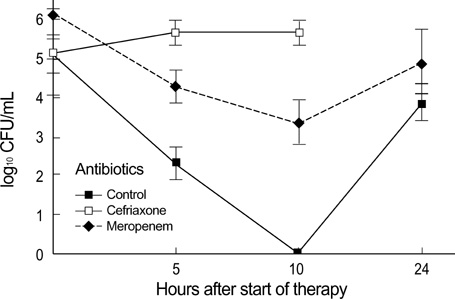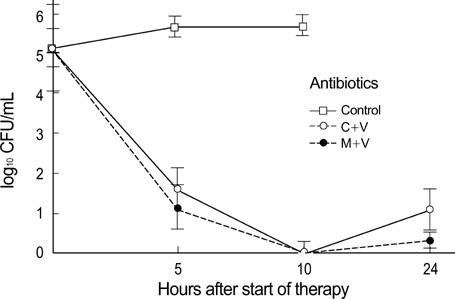J Korean Med Sci.
2004 Feb;19(1):21-26. 10.3346/jkms.2004.19.1.21.
Therapeutic Efficacy of Meropenem for Treatment of Experimental Penicillin-Resistant Pneumococcal Meningitis
- Affiliations
-
- 1Division of Infectious Diseases, Department of Medicine, Samsung Medical Center, Sungkyunkwan University School of Medicine, Seoul, Korea.
- 2Division of Infectious Diseases, Department of Medicine, Kyungpook National University Hospital, Daegu, Korea.
- 3Division of Infectious Diseases, Department of Medicine, Veterans Hospital, Seoul, Korea.
- 4Division of Infectious Diseases, Department of Medicine, Dong-A University Hospital, Busan, Korea.
- 5Asian-Pacific Research Foundation for Infectious Diseases (ARFID), Seoul, Korea.
- KMID: 1785688
- DOI: http://doi.org/10.3346/jkms.2004.19.1.21
Abstract
- With the widespread emergence of antimicrobial resistance, combination regimens of ceftriaxone and vancomycin (C+V) or ceftriaxone and rifampin (C+R) are recommended for empirical treatment of pneumococcal meningitis. To evaluate the therapeutic efficacy of meropenem (M), we compared various treatment regimens in arabbit model of meningitis caused by penicillin-resistant Streptococcus pneumoniae (PRSP). Therapeutic efficacy was also evaluated by the final bacterial concentration in the cerebrospinal fluid (CSF) at 24 hr. Each group consisted of six rabbits. C+V cleared the CSF at 10 hr, but regrowth was noted in 3 rabbits at 24 hr. Meropenem monotherapy resulted in sterilization at 10 hr, but regrowth was observed in all 6 rabbits at 24 hr. M+V also resulted in sterilization at 10 hr, but regrowth was observed in 2 rabbits at 24 hr. M+V was superior to the meropenem monotherapy at 24 hr (reduction of 4.8 vs. 1.8 log10 cfu/mL, respectively; p=0.003). The therapeutic efficacy of M+V was comparable to that of C+V (reduction of 4.8 vs. 4.0 log10 cfu/mL, respectively; p=0.054). The meropenem monotherapy may not be a suitable choice for PRSP meningitis, while combination of meropenem and vancomycin could be a possible alternative in the treatment of PRSP meningitis.
MeSH Terms
Figure
Reference
-
1. Tan TQ. Antibiotic resistant infections due to Streptococcus pneumoniae: impact on therapeutic options and clinical outcome. Curr Opin Infect Dis. 2003. 16:271–277.
Article2. Tomasz A. New faces of an old pathogen: emergence and spread of multidrug-resistant Streptococcus pneumoniae. Am J Med. 1999. 107:55S–62S.
Article3. Song JH, Lee NY, Ichiyama S, Yoshida R, Mirakata Y, Fu W, Chongthaleong A, Aswapokee N, Chiu CH, Lalitha MK, Thomas K, Perera J, Yee TT, Jarnal F, Warsa UC, Vinh BX, Jacobs MR, Appelbaum PC, Pai CH. Spread of drug-resistant Streptococcus pneumoniae in Asian countries: Asian Network for Surveillance of Resistant Pathogens (ANSORP) Study. Clin Infect Dis. 1999. 28:1206–1211.4. Forward KR. The epidemiology of penicillin resistance in Streptococcus pneumoniae. Semin Respir Infect. 1999. 14:243–254.5. Hoban DJ, Doern GV, Fluit AC, Roussel-Delvallez M, Jones RN. Worldwide prevalence of antimicrobial resistance in Streptococcus pneumoniae, Haemophilus influenzae, and Moraxella catarrhalis in the SENTRY Antimicrobial Surveillance Program, 1997-1999. Clin Infect Dis. 2001. 32:Suppl 2. S81–S93.6. Auburtin M, Porcher R, Bruneel F, Scanvic A, Trouillet JL, Bedos JP, Regnier B, Wolff M. Pneumococcal meningitis in the intensive care unit: prognostic factors of clinical outcome in a series of 80 cases. Am J Respir Crit Care Med. 2002. 165:713–717.7. Durand ML, Calderwood SB, Weber DJ, Miller SI, Southwick FS, Caviness VS Jr, Swartz MN. Acute bacterial meningitis in adults. A review of 493 episodes. N Engl J Med. 1993. 328:21–28.8. Bradley JS, Connor JD. Ceftriaxone failure in meningitis caused by Streptococcus pneumoniae with reduced susceptibility to beta-lactam antibiotics. Pediatr Infect Dis J. 1991. 10:871–873.9. Sloas MM, Barrett FF, Chesney PJ, English BK, Hill BC, Tenover FC, Leggiadro RJ. Cephalosporin treatment failure in penicillin- and cephalosporin-resistant Streptococcus pneumoniae meningitis. Pediatr Infect Dis J. 1992. 11:662–666.10. Pacheco TR, Cooper CK, Hardy DJ, Betts RF, Bonnez W. Failure of cefotaxime treatment in an adult with Streptococcus pneumoniae meningitis. Am J Med. 1997. 102:303–305.
Article11. Viladrich PF, Gudiol F, Linares J, Pallares R, Sabate I, Rufi G, Ariza J. Evaluation of vancomycin for therapy of adult pneumococcal meningitis. Antimicrob Agents Chemother. 1991. 35:2467–2472.
Article12. Tunkel AR, Scheld WM. Treatment of bacterial meningitis. Curr Infect Dis Rep. 2002. 4:7–16.
Article13. Kaplan SL, Mason EO Jr. Management of infections due to antibiotic-resistant Streptococcus pneumoniae. Clin Microbiol Rev. 1998. 11:628–644.
Article14. Quagliarello VJ, Scheld WM. Treatment of bacterial meningitis. N Engl J Med. 1997. 336:708–716.
Article15. Hurst M, Lamb HM. Meropenem: a review of its use in patients in intensive care. Drugs. 2000. 59:653–680.16. Vandecasteele SJ, Verhaegen J, Colaert J, Van Caster A, Devlieger H. Failure of cefotaxime and meropenem to eradicate meningitis caused by an intermediately susceptible Streptococcus pneumoniae strain. Eur J Clin Microbiol Infect Dis. 2001. 20:751–752.
Article17. John CC, Aouad G, Berman B, Schreiber JR. Successful meropenem treatment of multiply resistant pneumococcal meningitis. Pediatr Infect Dis J. 1997. 16:1009–1011.
Article18. Friedland IR, Paris M, Ehrett S, Hickey S, Olsen K, McCracken GH Jr. Evaluation of antimicrobial regimens for treatment of experimental penicillin- and cephalosporin-resistant pneumococcal meningitis. Antimicrob Agents Chemother. 1993. 37:1630–1636.
Article19. Gerber CM, Cottagnoud M, Neftel KA, Tauber MG, Cottagnoud P. Meropenem alone and in combination with vancomycin in experimental meningitis caused by a penicillin-resistant pneumococcal strain. Eur J Clin Microbiol Infect Dis. 1999. 18:866–870.
Article20. NCCLS. Performance Standards for Antimicrobial Susceptibility Testing. Eleventh Informational Supplement. 2001. 21:M100.21. Dacey RG, Welsh JE, Scheld WM, Winn HR, Jane JA, Sande MA. Alterations in cerebrospinal fluid outflow resistance in experimental bacterial meningitis. Trans Am Neurol Assoc. 1978. 103:142–146.22. John CC. Treatment failure with use of a third-generation cephalosporin for penicillin-resistant pneumococcal meningitis: case report and review. Clin Infect Dis. 1994. 18:188–193.
Article23. Catalan MJ, Fernandez JM, Vazquez A, Varela de Seijas E, Suarez A, Bernaldo de Quiros JC. Failure of cefotaxime in the treatment of meningitis due to relatively resistant Streptococcus pneumoniae. Clin Infect Dis. 1994. 18:766–769.
Article24. Ahmed A, Jafri H, Lutsar I, McCoig CC, Trujillo M, Wubbel L, Shelton S, McCracken GH Jr. Pharmacodynamics of vancomycin for the treatment of experimental penicillin- and cephalosporin-resistant pneumococcal meningitis. Antimicrob Agents Chemother. 1999. 43:876–881.
Article25. Balfour JA, Bryson HM, Brogden RN. Imipenem/cilastatin: an update of its antibacterial activity, pharmacokinetics and therapeutic efficacy in the treatment of serious infections. Drugs. 1996. 51:99–136.26. Lowe MN, Lamb HM. Meropenem: an updated review of its use in the management of intra-abdominal infections. Drugs. 2000. 60:619–646.27. Dagan R, Velghe L, Rodda JL, Klugman KP. Penetration of meropenem into the cerebrospinal fluid of patients with inflamed meninges. J Antimicrob Chemother. 1994. 34:175–179.
Article28. Pikis A, Donkersloot JA, Akram S, Keith JM, Campos J, Rodriguez WJ. Decreased susceptibility to imipenem among penicillin-resistant Streptococcus pneumoniae. J Antimicrob Chemother. 1997. 40:105–108. Erratumin: J Antimicrob Chemo Ther 1997; 40: 462.29. Fuchs PC, Barry AL, Brown SD. Pneumococcal susceptibility to meropenem. J Antimicrob Chemother. 1996. 37:1036–1037.
Article30. Doern GV, Brueggemann A, Holley HP Jr, Rauch AM. Antimicrobial resistance of Streptococcus pneumoniae recovered from outpatients in the United States during the winter months of 1994 to 1995: results of a 30-center national surveillance study. Antimicrob Agents Chemother. 1996. 40:1208–1213.
Article31. Doit CP, Bonacorsi SP, Fremaux AJ, Sissia G, Cohen R, Geslin PL, Bingen EH. In vitro killing activities of antibiotics at clinically achievable concentrations in cerebrospinal fluid against penicillin-resistant Streptococcus pneumoniae isolated from children with meningitis. Antimicrob Agents Chemother. 1994. 38:2655–2659.
Article
- Full Text Links
- Actions
-
Cited
- CITED
-
- Close
- Share
- Similar articles
-
- Two Cases of Meningitis Caused by Penicillin-and Cephalosporin-resistant Streptococcus pneumoniae
- In vitro Efficacy of Antibiotic Combinations against Multidrug-resistant Streptococcus pneumoniae
- Development of Spinal Epidural Abscess during Treatment of Pneumococcal Meningitis
- Changing Patterns of Antibiotic-resistant Rates and Clinical Features in Pneumococcal Infections
- Clinical Characteristics of Pneumococcal Bacteremia in Adults: The Effect of Penicillin Resistance on the Mortality of Patients with Pneumococcal Bacteremia





